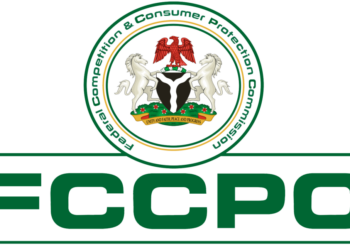- Nairametrics recently published an article on the continued harassment and defamation of customers by some digital lending platforms (Loan Apps).
- In reaction to the article, the CEO of the Federal Competition and Consumer Protection Commission (FCCPC) Mr. Babatunde Irukera granted an interview with Arise TV.
- The CEO complimented Nairametrics’ reporting and promised that the commission will investigate the allegations raised in the publication towards taking the necessary actions against culpable offenders.
Digital lending platforms have found themselves in the spotlight following the continuous defamation and harassment of customers despite efforts by FCCPC to regulate their practices.
A recent Nairametrics report shed more spotlight on the issue leading to the CEO of the FCCPC Mr. Babatunde Irukera reacting on his social media handle.
In this interview, Nairametrics reached out to the commission Czar to share his views on our recent findings.
We also engaged him on the regulatory framework for digital lending platforms as well as other pertinent issues relating to the Nigerian consumer.
Nairametrics: Tell us a bit about your background and how you came to be the CEO of the FCCPC.
Babatunde Irukera: My professional background is being a lawyer. I started my legal career as a corporate in-house counsel in a bank after NYSC in 1991, then became General Counsel in a public company.
In 1996, I became licensed before the Washington State Supreme Court as my second licensure in addition to Nigeria.
Between 1996 and 2006, I engaged in legal practice as a founding partner in a law firm where I did transactions; regulatory representations before administrative bodies like the then U.S. Immigration & Naturalization Service, Immigration Court, Board of Immigration Appeals, U.S. Equal Employment Opportunity Office; litigation in both civil and criminal defence before multiple U.S. District Courts in different states, as well as Courts of Appeals of different circuits, and periodic representation of clients in Nigerian matters, and before Nigerian courts.
I returned to Nigeria and in 2007, I was also a founding partner in a firm that in a very short period of time became one of the leading firms in Nigeria in corporate work, and even more so in litigation, particularly public interest litigation and government relations, including prosecuting and settling landmark cases like the matter of Pfizer, a large pharmaceutical company and a failed clinical trial in Kano in 1996.
Pfizer settled the case in 2009 as the largest civil settlement yet in Nigeria.
I believe that, in part on account of a record and history of engagements in consumer protection issues, competition advocacy and development, as well as advising regulatory authorities on consumer protection and competition law, I was considered for leadership as Director General of the then Consumer Protection Council (CPC).
Two key self-imposed mandates for me were to strengthen consumer protection advocacy and regulation; and midwife a composite and more robust competition regulatory framework for, and in Nigeria.
These are contributory factors that led to the enactment of the Federal Competition & Consumer Protection Act (FCCPA) which transmuted the CPC to the Federal Competition & Consumer Protection Commission (FCCPC).
This is a short story about my background and how I came to be the Executive Vice Chairman and Chief Executive Officer of the FCCPC.
Nairametrics: Your Commission supervises virtually all industries in relation to consumer issues, which is quite enormous. What are your top priority industries?
Babatunde Irukera: Indeed, the FCCPA applies to ALL commercial activities having an impact in Nigeria, including in some instances, conduct or activities occurring outside Nigeria but having an impact in Nigeria.
So, you are right in your characterization of the scope of the work of the Commission, and it is truly enormous.
In reality, de-prioritizing any statutory mandate is in a manner of speaking a failure, so we don’t have an articulated policy that subordinates any industry to another or makes them inferior with respect to enforcement of the law.
However, as a practical matter, and from a resource allocation standpoint, it must seem like there are priorities. That said, we respond and allocate resources based on a number of factors such as the importance of the industry to national interest or priorities, in which case, food and other fast-moving goods or services must necessarily be the focus of resources as will be the case with power, financial services, transportation (air and land), telecommunications, and more recently digital markets.
In reality, the vast majority of economic activity occurs in these industries. That said, the nature of the regulatory frameworks in each industry is an important determinant in our prioritization.
Where a core or sector regulator substantially addresses some of the consumer protection issues, our resource allocation is more to complement the existing framework compared to where the effort is not as robust.
The structure of the market in each industry is also a factor. This structure will show how satisfied or otherwise consumers are by the volume of complaints, the responsiveness of businesses and whether that structure needs to be modified.
In addition, the level of concentration in an industry is a critical factor in competition regulation. Typically, the more players exist, the more competitive the market is likely to be.
So, the short answer is that we don’t have a magic list of what we consider a priority, but our formula and matrix make it apparent and empirically supported where most of our resources are allocated.
Nairametrics: Before coming up with the registration framework for loan apps, the FCCPC had been doing a lot in checking the activities of digital lenders as it relates to consumer issues, what are the FCCPC’s concerns about the operations of loan apps in Nigeria?
Babatunde Irukera: Our Limited and Interim Guidelines and Regulatory Framework is a product of a series of engagements, interactions and investigative activities.
The Joint Enforcement & Regulatory Taskforce made up of the NCC, CBN, NITDA, ICPC, EFCC, NHRC and FCCPC did significant work in developing the investigative template, and the joint enforcement activities by some of the members, and the lessons learned from member functions and evidence gathered in the course of the investigations provided some clarity and direction that helped to develop the Framework.
In particular stakeholders such as Google, banks and payment gateways became important to curbing excesses.
Our concern is similar to global challenges with respect to digital lending. Technology is an incredible tool and platform for expansion and shared prosperity; however, it is sadly also a potential tool for exploiting and impoverishing people.
We are now certain that those who are willing to do business ethically have come within the Framework, while those determined to engage in illegal and abusive conduct find other means.
Although the potential for their businesses and patronage is severely diminished by the regulatory and enforcement framework, the Internet still makes it possible for them to engage in business anyway.
We are also discovering that some within the Framework are creating alternative channels outside of the Framework to do business.
As we find those ones, we permanently, without opportunity for renewal or return remove them from the list allowed to operate.
The painstaking work of tracking businesses on the internet and holding them accountable is a global phenomenon and challenge that regulators and law enforcers are struggling with internationally.
Nigeria is not excluded. Indeed, many, even more developed countries and platforms including Google are borrowing from some of the efforts that have so far worked in Nigeria.
When we engage with enforcers and regulators from other countries, sometimes their perception is that our concerns are not necessarily illegitimate, but inferior to theirs, especially with respect to internet-based exploitation arising potentially from Nigeria in the names of advanced fee and other frauds as well as romance and “promise to marry” scams.
Essentially, the point here is that regulation and control of the world wide web is on the cusp and curve of regulatory learning, not just in Nigeria, and regulators in Nigeria are not behind in many respects.
One other critical point is that the advocacy and campaign for an outright ban, while understandable, is simplistic and presents no solution.
For a business that can evade regulatory interfaces including operating entirely offshore, and possessing the versatility to evolve, rebrand, relaunch, rebirth or relocate on the internet and needing no physical location, a ban is at best only a pronouncement, and may very well amount to nothing much more than that.
The very hard and continuous work of tracking and reigning illegality in with respect to this industry is the task we must all commit to, and it requires a lasting collaborative effort and vigilance by both consumers and regulators because it is impossible for regulators to have all the information to successfully track these businesses.
On a final note, eliminating the service and potential they provide for financial inclusion and expanding prosperity when done correctly, will be to exclude some of the most vulnerable members of society from commerce and meeting critical needs at crucial times.
The call for outright banning is ill-advised, and in most cases supported by former victims which is understandable, but insufficient for policymaking.
Under an administration whose desire and focus is to expand prosperity and reach the least in society, reduce poverty and empower the vulnerable, the mandate we as regulators must embrace is the hard work and road to accomplish that, not the supposedly easy approach of blanket bans and grandstanding.
Nairametrics: Can you tell us some of the most common complaints that the FCCPC has received about loan apps?
Babatunde Irukera: The most prevalent complaints are defamatory messages published to contact lists of borrowers, manufactured and false information propagated about the borrowers, threats and harassment of borrowers or persons on their contact lists, and aggravating and unwelcomed disruptive calls and texts by third parties because their names and information occurred on a borrower’s contact list.
Other complaints apart from these inappropriate recovery methods are onerous terms such as fees as well as interest rates and balance calculations that are exploitative.
Nairametrics: What are your thoughts on the high-interest rates charged by loan apps and the role they are playing in providing alternative access to credit for Nigerians?
Babatunde Irukera: Our expertise at the FCCPC does not include monetary or lending policies such as prevailing interest rates.
However, I personally understand that unsecured loans such as these instant loans carry the highest repayment risk; and as such, it is customary globally for such loans to attract significantly higher interest rates than traditional lending which are either secure or where the lender has other information, relationship, history or record regarding the borrower that assists in the lending decision.
However, the appropriateness of an interest rate regime is best determined by a prudential regulator whose core role is the safety and stability of financial institutions or the system.
Our limited knowledge and contribution though is that interest compounding by adding outstanding interest payments to principal outstanding for the purpose of calculating outstanding balances is unfair and prohibited, and we enforce that where we find such.
One of the expectations of the FCCPC is that the limited and interim regulatory framework it has created will give way to a more robust and standing framework where the prudential regulator’s role will be clear and apparent.
Nairametrics: With over 180 digital lenders now registered by the FCCPC, what are your expectations regarding how they conduct their businesses?
Babatunde Irukera: To an extent, some of our expectations were met when the level of aggravation, dissatisfaction, and complaints reduced after we implemented the Framework because this demonstrated that the intervention worked.
What has been emerging in the past few weeks again is a resurgence of illegal practices as businesses are discovering and engaging other platforms to conduct business in the manner the FCCPC has prohibited and disallowed.
We are continuing our pursuit into these new spaces, and enforcing strongly against any business that has been legalized but failed the compliance test or standard.
Nairametrics: Nairametrics recently investigated and discovered that defaming and harassing borrowers have continued, even by some of the registered loan apps, what is the Commission going to do to address this?
Babatunde Irukera: The Commission acknowledges and followed the Nairametrics story, and actually welcomes such investigative journalism.
However, considering the Commission has taken the position that there would absolutely be no second chance for any business that is legalized and listed that does this, the Commission is doing the work of validating the allegations.
Without questioning the veracity or authenticity of the investigation by Nairametrics, it will still be irresponsible for a regulator to act without creating a record of its own assessment and validation.
And right now, some of the previously approved businesses are in the process of being delisted on account of this.
Nairametrics: Is the FCCPC empowered enough to regulate these digital lenders, considering that some of them are licensed by the Central Bank of Nigeria?
Babatunde Irukera: As previously noted, the vast majority of FCCPC’s role in responding to this problem has been because of an alarmingly increasing level of complaints and unfortunate outcomes.
The most efficient and optimized regulatory framework will certainly include a financial services regulator at the core of the regulatory effort, and we look forward to that.
Nairametrics: Some digital lending companies operate multiple loan apps. How do you track them, especially in cases where they create new ones in order to continue their unethical practices of loan recovery?
Babatunde Irukera: One of the requirements under the Guidelines in the limited and interim regulatory framework is to provide the names or identifiers of every app each business intends to use, and update when that changes, is modified or substituted.
Operating any other app without prior noting is a violation. We also, however, depend on consumers to bring the information to our attention as there is probably no practical or effective way for the regulator to timely become aware of all and every app existing or in operation.
Nairametrics: What advice would you give Nigerians who have the habit of approaching loan apps for credit without any intention of paying back?
Babatunde Irukera: There is absolutely no advice for people who intend to borrow without paying back. They set out with an impermissible objective and represent the bad eggs in society.
They are not the “consumers” the law seeks to protect, or the consumers the FCCPC must protect.
As a matter of fact, they are threats to real consumers because they make the service the real consumers desire expensive, difficult to secure, or potentially nonexistent.
It is a different thing if circumstances make repayment of a loan difficult, but to borrow with the intention of not paying is insidious and underserving of the protection of the law.
Their intention and conduct cannot possibly justify a lender’s violation of the law, but such a borrower’s inappropriate conduct is not the basis for holding the lender accountable.
Nairametrics: What are your thoughts on the role of consumers in protecting themselves from predatory lending practices?
Babatunde Irukera: The first and most important role is to consider and recognize the entire enterprise of borrowing in the circumstances they find themselves and understand the obligation to pay back in accordance with the applicable terms.
Self-regulation and restraint are important components of behavioural modification.
The ease of access to money is a good thing for commerce and meeting needs, but it should not overshadow the responsibility of repaying that is necessarily associated with and at the core of borrowing.
And when borrowing is appropriate and or inevitable, it should be from approved lenders. The FCCPC has dedicated significant resources to curating those who have a system that makes it less likely that the borrower will be subject to inappropriate conduct, and when that occurs, the regulator knows exactly how to impose the appropriate consequence.
For unregistered businesses, there is no indication that the regulator even knows them, much less how to enforce the rights of the consumers in the event of infringements.
Nairametrics: What advice would you give to other regulators who are working to protect consumers from predatory lending practices?
Babatunde Irukera: The work is complex and unending but vital and crucial to society. As such, whatever it takes, we must keep at it. In addition, the predators are versatile, and won’t stop.
When one channel is plugged by regulatory intervention, they will proceed to find another, so we must keep at it and be relentless in pursuit of predators to ensure consumers are not easy prey.





















All agents of digital lenders can as well be held accountable for their actions, they are Nigerians after all subject to the laws of the nation and have registed phone numbers with verified identities.
For unknown digital loan apps once the agent is apprehended for defaming a consumer, that agent must now provide the location of the lender as well as all their contacts of other agents and will also provide the regulator with immediate access to their company’s dashboard, when this is done on a regular basis and these agents made examples off, the defamation will reduce